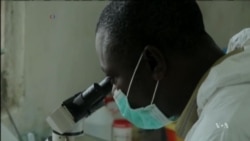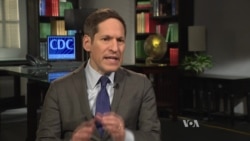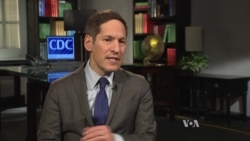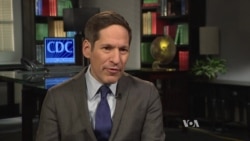No one knows what new infectious disease will be the next to wreak havoc or where it will strike, but public health experts on Monday kicked off the second Global Health Security Agenda (GHSA) Meeting in Seoul to explore ways to ensure there never will be another deadly epidemic like last year's Ebola outbreak in West Africa.
At the height of that epidemic, national governments, health workers, non-profits, Doctors Without Borders and the U.S. Centers for Disease Control (CDC) played important roles in working to resolve the outbreak. Ahead of today's global conference in Seoul, CDC director Dr. Tom Frieden recalled the extent of the response in a one-on-one conversation with VOA's Carol Pearson.
"CDC has been involved in every aspect of the response," he said. "We’ve done more than 23,000 laboratory tests for Ebola in West Africa, and we’ve had staff do contact tracing, monitoring of cases and contacts in virtually every community where the disease has been spreading."
After the initial response, he said, CDC researchers reviewed analyzed the data to improve the response, such that CDC officials could then target efforts where they would have the most effectiveness.
"We’ve trained literally tens of thousands of health care workers to reduce their risk of infection and find Ebola patients quickly so they don’t spread it rapidly," he said.
Goal is ‘zero’
After visiting affected countries in West Africa three times, most recently in late August, Frieden said his aim has been to make sure they are "well on the track to zero ... And to think about what [comes] next so we can ensure that never again do we have another Ebola epidemic like this one."
At the top of the Global Health Security Agenda — an international effort by nations and organizations to make the world safe from infectious diseases — is strengthening the health care systems of poor countries.
The most important single lesson from Ebola in West Africa is that every country needs the ability to do three things, which, as Frieden describes it, is what the GHSA is all about. "Find a health threat when it first emerges, stop it promptly, and prevent it wherever possible," he said, adding that Ebola-stricken countries have to be prepared for other health threats that may be coming.
Ebola pandemic averted
Frieden also drew a comparison between Nigeria and the three most adversely affected countries: Sierra Leone, Guinea and Liberia.
"When Ebola hit Lagos [Nigeria], it was the most frightening moment of the Ebola epidemic," he said. That's because Lagos, with a population of 21 million, is the most populous city in Africa. It's also a crossroads.
"If Ebola had gotten out of control in Lagos, it could have spread all over Nigeria, all over Africa for years to come," he said.
But it didn't. The polio-eradication system that Nigeria had in place saved the country from the spread of Ebola, and Nigeria had laboratories and trained workers to find the 900 people who had been exposed to Ebola.
"They identified 19 secondary cases, built an Ebola treatment unit in 14 days, and stopped the outbreak. If they hadn't done that, the world would be a very different place today," Frieden said, describing it as "the kind of system we need to have in place all over the world."
Despite the Ebola scare, Frieden said the world has made progress in tracking and stopping infectious diseases, pointing to a bird flu scare that was brought under control after breaking out in China earlier this year. Although new outbreaks were reported in August, epidemiologists are at work to contain it.
"Compare that with 10 years ago with SARS [severe acute respiratory syndrome], when it cost the world more than 40 billion dollars and enormous disruption," Frieden said. Early in the epidemic, China discouraged its press from reporting on SARS and did not report it to the World Health Organization for several months. The virus spread to countries in North America, South America, Europe, and Asia before it was contained.
Prevention efforts
In West Africa, Frieden said countries are making efforts to prevent other diseases from spreading, citing efforts in Liberia, Guinea and Sierra Leone, whose officials are focusing on the community level where diseases can be reported and stopped before they get out of control.
"Liberia just had two real successes," he said. "After getting to zero with Ebola, they've done a bed net campaign and given out 2.7 million bed nets around the country" to thwart malaria.
Frieden also said Liberia has had some success with the launch of a measles vaccination campaign.
"West Africa has gone through a devastating Ebola epidemic that killed thousands of people from Ebola, but also thousands more from malaria and other conditions because the health care system had to stop operating. One thing that is very encouraging is that we now have progress there and the systems are being put into place to find a threat such as Ebola when it first emerges," he said. "Because of that, it's my hope and my expectation that the world will never, ever have to experience another epidemic of Ebola as we have for the past year in West Africa."
But it's the flu, not exotic diseases like Ebola or SARS, that poses the biggest global threat, he says. Global deaths from influenza could amount to hundreds of thousands during a mild flu season to millions of deaths during a pandemic.
"A flu pandemic remains the nightmare scenario for public health," he said. "We continue to work around the clock and around the world to better detect flu as it spread, to better respond to it when it spreads, and to work for a breakthrough in a better vaccine."
Because of increased travel and global commerce, Frieden and other public health experts recognize that an outbreak of infectious disease anywhere threatens the health of people everywhere. But, he said, it is his hope and expectation that the world will never, ever have to experience another epidemic of Ebola as was seen in West Africa.








